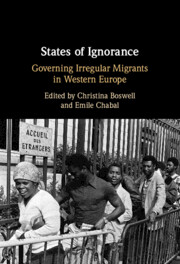Book contents
- States of Ignorance
- States of Ignorance
- Copyright page
- Contents
- About the Editors and Contributors
- Acknowledgements
- Introduction
- 1 States, Knowledge and Ignorance
- 2 The Post-war European State and (Irregular) Migration
- 3 The Invention of Illegal Immigration
- 4 (Im)perfect Control
- 5 From Ignorance to Illegalisation
- 6 Denial, Elucidation or Resignation? British and German State Responses to Unauthorised Migrants
- 7 To See or Not to See
- 8 European Integration and the Leap into the Unknown
- 9 Control Infrastructures and Ignorance
- Index
- References
1 - States, Knowledge and Ignorance
Published online by Cambridge University Press: 02 November 2023
- States of Ignorance
- States of Ignorance
- Copyright page
- Contents
- About the Editors and Contributors
- Acknowledgements
- Introduction
- 1 States, Knowledge and Ignorance
- 2 The Post-war European State and (Irregular) Migration
- 3 The Invention of Illegal Immigration
- 4 (Im)perfect Control
- 5 From Ignorance to Illegalisation
- 6 Denial, Elucidation or Resignation? British and German State Responses to Unauthorised Migrants
- 7 To See or Not to See
- 8 European Integration and the Leap into the Unknown
- 9 Control Infrastructures and Ignorance
- Index
- References
Summary
Most accounts of states and knowledge see knowledge as crucial to realising state governing projects and for underpinning the ‘epistemic authority’ of the state. This chapter questions the underlying assumptions these accounts make about state motivation or rationality. Building on theories of state legitimation, it argues that we should see knowledge production as highly selective and contingent. The chapter then elaborates on the three lenses for exploring ignorance: (a) omission, inspired by theories of bounded rationality and information processing; (b) strategy, building on sociological and anthropological notions of strategic ignorance and (c) ascription, building on theories of social movements and focusing on processes of claims-making and political contestation that expose state ignorance.
- Type
- Chapter
- Information
- States of IgnoranceGoverning Irregular Migrants in Western Europe, pp. 33 - 58Publisher: Cambridge University PressPrint publication year: 2023



